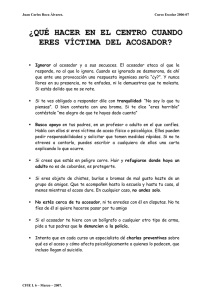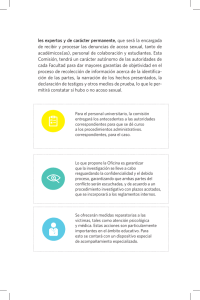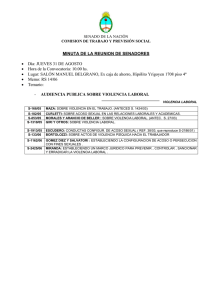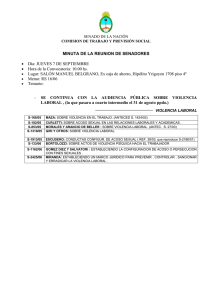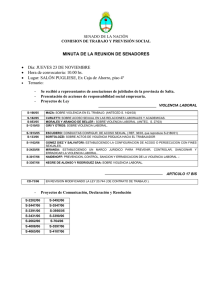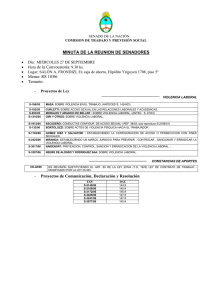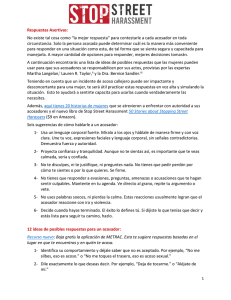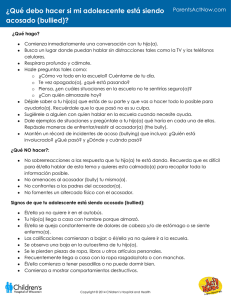JBAAR SEXUAL HARASSMENT STUDENTS
Anuncio
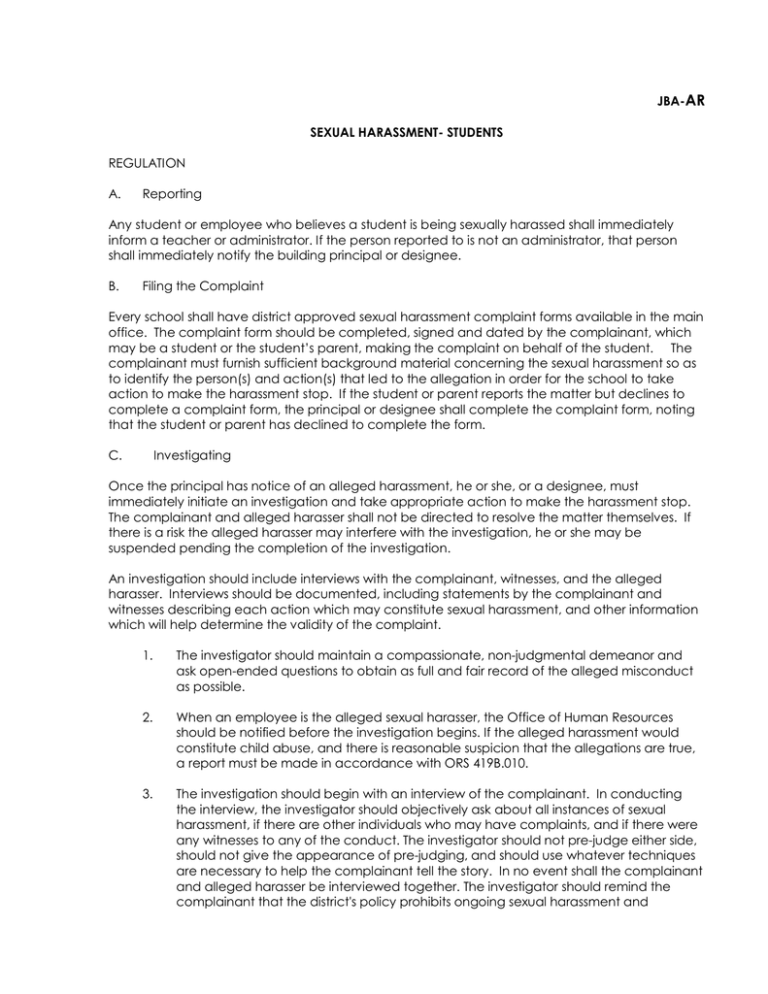
JBA­AR SEXUAL HARASSMENT­ STUDENTS REGULATION A. Reporting Any student or employee who believes a student is being sexually harassed shall immediately inform a teacher or administrator. If the person reported to is not an administrator, that person shall immediately notify the building principal or designee. B. Filing the Complaint Every school shall have district approved sexual harassment complaint forms available in the main office. The complaint form should be completed, signed and dated by the complainant, which may be a student or the student’s parent, making the complaint on behalf of the student. The complainant must furnish sufficient background material concerning the sexual harassment so as to identify the person(s) and action(s) that led to the allegation in order for the school to take action to make the harassment stop. If the student or parent reports the matter but declines to complete a complaint form, the principal or designee shall complete the complaint form, noting that the student or parent has declined to complete the form. C. Investigating Once the principal has notice of an alleged harassment, he or she, or a designee, must immediately initiate an investigation and take appropriate action to make the harassment stop. The complainant and alleged harasser shall not be directed to resolve the matter themselves. If there is a risk the alleged harasser may interfere with the investigation, he or she may be suspended pending the completion of the investigation. An investigation should include interviews with the complainant, witnesses, and the alleged harasser. Interviews should be documented, including statements by the complainant and witnesses describing each action which may constitute sexual harassment, and other information which will help determine the validity of the complaint. 1. The investigator should maintain a compassionate, non­judgmental demeanor and ask open­ended questions to obtain as full and fair record of the alleged misconduct as possible. 2. When an employee is the alleged sexual harasser, the Office of Human Resources should be notified before the investigation begins. If the alleged harassment would constitute child abuse, and there is reasonable suspicion that the allegations are true, a report must be made in accordance with ORS 419B.010. 3. The investigation should begin with an interview of the complainant. In conducting the interview, the investigator should objectively ask about all instances of sexual harassment, if there are other individuals who may have complaints, and if there were any witnesses to any of the conduct. The investigator should not pre­judge either side, should not give the appearance of pre­judging, and should use whatever techniques are necessary to help the complainant tell the story. In no event shall the complainant and alleged harasser be interviewed together. The investigator should remind the complainant that the district's policy prohibits ongoing sexual harassment and retaliation and encourage him/her to come forward if there is further sexual harassment or retaliatory conduct. 4. In most cases, the second step of the investigation should be interviewing witnesses and gathering information to interview the alleged harasser. Witnesses may have seen the events and may be able to describe the conduct as well as the complainant’s reaction or response. They may also have witnessed other events or incidents corroborating or disproving the versions of the complainant or the alleged harasser. Witnesses should be advised that the conduct under investigation is sensitive and confidential (except to the extent the witness may be called to testify if the matter goes to hearing or trial), and should not be discussed outside of the investigation. 5. In interviewing the alleged harasser, the investigator should review the complainant’s allegations and give the alleged harasser an opportunity to admit, deny, or explain the circumstances. The investigator should also ask the alleged harasser for names of witnesses that may substantiate his/her position. The alleged harasser should be reminded of the district's policy against sexual harassment and that retaliatory conduct is prohibited. The alleged harasser should also be told he or she is not to make any contact with the complainant pending the conclusion of the investigation. D. Determining if Sexual Harassment Has Occurred 1. Once the investigation has been completed, if the investigator is not the principal, the information should be given to the principal, who shall review the facts and determine whether or not sexual harassment has occurred and the appropriate discipline if sexual harassment has occurred. The decision­making process, which factors were considered, and what significance they had in the determination should be documented. Factors which may be considered include but are not limited to: · The nature of the conduct · How often the conduct occurred · How long the conduct continued · The age, maturity and sex of the student · Whether the complainant found the conduct unwelcome · Impact of the conduct on the student’s education or educational environment · Whether the alleged harasser was in a position of power over the student subjected to the harassment · Number of alleged harassers · Age of the alleged harasser · Where the harassment occurred · Other incidents of sexual harassment at the school involving the same or other students 2. The principal shall respond in writing to the complainant, the alleged harasser, and the parents of each within fourteen (14) days with one of the following three statements: a. that the district does not have adequate evidence to conclude that harassment occurred; Even if the principal decides the alleged sexual harassment cannot be corroborated, action should be taken to avoid a subsequent similar behavior. The principal should advise the complainant and the alleged harasser (separately) of the outcome of the investigation and how the conclusion was reached. Any meetings or discussion should 2 be documented. If the complainant and alleged harasser must continue to interact, the situation should be monitored to minimize the potential for a retaliation claim and to avoid any adverse impact on the complainant’s school performance. b. that sexual harassment occurred, and delineating the corrective actions the district intends to take; or If a determination is made that sexual harassment occurred, the school must take appropriate action to make the harassment stop. The severity of the conduct will be assessed, and the appropriate disciplinary action for the harasser will be determined, taking into account progressive disciplinary principles under E. below. The discipline should be documented, including the considerations which lead to the selection of the level of discipline. As a general rule, physical conduct merits stronger penalties than verbal conduct. Disciplinary action against a student will only be disclosed to other parties in accordance with the federal Family Educational Rights & Privacy Act (FERPA). c. that the investigation is incomplete to date and will be continuing. If the principal is still gathering information in the investigation, this should be explained (separately) to the complainant and the alleged harasser. The complainant and the alleged harasser should also be reminded of the district's commitment to enforcing the sexual harassment policy, and the complainant should be encouraged to come forward with any new or continuing concerns of sexual harassment. The investigator should periodically check with the complainant as the investigation continues to see if other concerns have arisen. Any meeting or discussion should be documented. 3. E. Upon the completion of the investigation, a copy of the complaint form and the disposition of the complaint shall be forwarded to the Title IX Coordinator. Sanctions for Sexual Harassment The purpose of any sanction is to make the harassment stop and prevent future occurrences. 1. First Offense­­All incidents will be documented and the parents/guardians/ custodians of the complainant and harasser will be notified. For less severe offenses, appropriate discipline could be a conference with the student, counseling, or an educational activity to make the student aware of the impact and prohibition of sexual harassment in the school. In situations where the sexual harassment is severe, suspension or expulsion may be imposed. 2. Second Offenses­­All incidents will be documented, and the parents/guardians/ custodians of the complainant and harasser will be notified. Depending upon the seriousness of the offense, discipline could range from suspension to expulsion. 3. Subsequent Offenses­­All incidents will be documented, and the parents/ guardians/custodians of the complainant and harasser will be notified. The alleged harasser is subject to suspension or expulsion. 4. When behavior constituting sexual harassment also may constitute criminal activity, law enforcement may be notified by the superintendent or designee. The District reserves the right to impose disciplinary sanctions for sexual assault independent of any criminal penalties that may be imposed. 3 5. F. For students in special education, disciplinary actions may be modified to conform to requirements of the Individuals with Disabilities Education Act. Title IX Coordinator The Superintendent shall appoint a Title IX Coordinator who duties shall include: 1. Promoting student understanding of how to recognize and prevent sexual harassment through age appropriate education, and review of the district policy and regulation. 2. Developing a district complaint form for reporting allegations of sexual harassment and making staff and students aware of the form and procedure for reporting. 3. Receiving and compiling sexual harassment complaints, and making an annual report to the superintendent. 4. Maintaining a record of sexual harassment training to district personnel. 4 JBA-AR ACOSO SEXUAL- ESTUDIANTES REGULACIÓN A. Reportando Todo estudiante o empleado que crea que un estudiante esta siendo acosado sexualmente debe inmediatamente informar a un maestro o administrador. Si a la persona a la que se le reportó no es un administrador, esa persona debe inmediatamente notificar al director del edifico o su designado. B. Completando la Queja Cada escuela debe tener el formulario aprobado por el distrito para quejas de acoso sexual disponible en la oficina principal. El formulario de queja debe ser completado, firmado y fechado por el reclamante, el cual puede ser un estudiante o los padres del estudiante, haciendo la queja a nombre del estudiante. El reclamante debe proveer suficientes material de antecedentes en relación al acoso sexual para identificar ala persona(s) y acción(es) que llevaron a la acusación para que la escuela pueda tomar acción para detener el acoso. Si el estudiante o los padres reportan el asunto pero declinan completar el formulario de queja, el director o su designado deberán completar el formulario de queja, anotando que el estudiante o los padres han declinado completar el formulario. C. Investigando Una vez que el director se haya percatado en un presunto acoso, el o ella, o un designado, deberá inmediatamente iniciar una investigación y tomar la acción apropiada para hacer que el acoso se detenga. El reclamante y el supuesto acosador no deben resolver directamente el asunto entre ellos. Si hay un riesgo de que el supuesto acosador pudiese intervenir con la investigación, él o ella deberá ser suspendido/a pendiente a la conclusión de la investigación. Una investigación deberá incluir entrevistas con el reclamante, testigos, y el supuesto acosador. Las entrevistas deben ser documentadas, incluyendo declaraciones por reclamante y los testigos describiendo cada acción que pudiese constituir un acoso sexual, y otra información la cual pueda ayudar a determinar la validez de la queja. 1. La investigación debe mantener una conducta compasiva, imparcial y hacer preguntas indefinidas para obtener un registro tan completo y justo de la supuesta mala conducta como sea posible. 2. Cuando un empleado es el supuesto acosador sexual, el Oficial de Recursos Humanos debe ser notificado antes de que comience la investigación. Si el supuesto acoso constituye abuso a un meno, y hay sospechas razonables de que las alegaciones son verdaderas, un reporte debe hacerse de acuerdo con ORS 419B.010. 3. La investigación debe comenzar con una entrevista del reclamante. Conducir una entrevista, el investigador debe preguntar objetivamente acerca de todas los ocasiones de acoso sexual, si hay otros individuos quienes pudieran tener quejas, y si hubieron testigos a cualquier de las conductas. El investigador no debe tener preenjuiciar a ninguna de las partes, ni tampoco debe de aparentar estar preenjuiciando, y debe usar cualquier técnica necesaria para ayudar al reclamante decir la historia. En ningún caso debe el reclamante y el supuesto acosador ser entrevistados juntos. El investigador debe recordarle al reclamante que la póliza del distrito prohíbe continuar con el acoso sexual y represalias y alentarle a que reporte si continúa el acoso sexual o una conducta vengativa. D. 4. En la mayoría de los casos, el segundo paso de la investigación deberá ser entrevistar a los testigos y reunir información para entrevistar al supuesto acosador. Los testigos pudieron haber visto los eventos y pudieran describir la conducta así como la reacción o respuesta del demandante. También pudieron haber sido testigos de otros eventos o incidentes que corroboran o desmienten las versiones del reclamante o el supuesto acosador. Los testigos deben ser advertidos que la conducta bajo investigación es sensitiva y confidencial (excepto en la medida que el testigo pueda ser llamado a testificar si el asunto va a una audiencia o juicio), y no debe discutirse fuera de la investigación. 5. En la entrevista con el supuesto acosador, el investigador debe revisar las alegaciones del demandante y darle al supuesto acosador una oportunidad par admitir, negar, o explicar las circunstancias. El investigador debe también preguntarle al supuesto acosador los nombres de los testigos que pudieran sustancias su posición. Se le debe recordar al supuesto acosador la póliza del distrito contra el acoso sexual y que la conducta vengativa esta prohibida. También se le debe decir al supuesto acosador que él/ella no debe tener ningún contacto con el demandante hasta la conclusión de la investigación. Determinando si el acoso sexual ha ocurrido 1. Una vez que la investigación ha sido completada, si el investigador no es el director, la información debe dársele al director, quien deberá revisar los hechos y determinará si el acoso sexual ha ocurrido o no y la disciplina apropiada si el acoso sexual ha ocurrido. Se debe documentar el proceso para tomar una decisión, cuales hechos fueron considerados y que significado tuvieron en la determinación. Factores que pueden ser considerados incluyen pero no se limitan a: • La naturaleza de la conducta • Que tan seguido ocurrió la conducta • Por cuento tiempo continuó la conducta • La edad, madurez y sexo del estudiante • Si el demandante consideró la conducta inoportuna • Impacto de la conducta en la educación del estudiante o ambiente educacional • Si el supuesto acosador estaba en una posición de poder sobre el estudiante sujeto al acoso • El numero de supuestos acosadores • Edad del supuesto acosador • Donde ocurrió el acoso • Otros incidentes de acoso sexual en la escuela que involucren al mismo u otros estudiantes 2. El director debe responder por escrito a la queja, al supuesto acosador, y los padres de cada uno dentro de lo catorce (14) días con uno de las siguientes tres declaraciones: a. Que el distrito no tiene la evidencia adecuada para concluir que el acoso ocurrió; 2 Aun aunque el director decida que el supuesto acoso sexual no puede ser corroborado, se debe tomar acción para evitar un comportamiento similar subsecuente. El director debe aconsejar al reclamante y al supuesto acosador (por separado) del resultado de la investigación y como se llegó a esta conclusión. Toda reunión o conversación debe ser documentada. Si el demandante y el supuesto acosador deben continuar interactuando, la situación debe ser monitoreada para minimizar una potencial reclamación de venganza y para evitar cualquier impacto adverso en el desempeño escolar del demandante. b. Que el acoso sexual ocurrió, y delineando las medidas correctivas que el distrito intenta tomar; o Si se hace una determinación de que el acoso sexual ocurrió, la escuela debe tomar medidas apropiadas para que el acoso se detenga. La severidad de la conducta será evaluada, y la medida disciplinaria apropiada para el acosador será determinada, tomando en cuenta los principios de disciplina progresiva bajo E. más adelante. La disciplina debe ser documentada, incluyendo las consideraciones que llevaron a la selección del nivel de disciplina. Como regla general, conducta física amerita penalidades más fuertes que una conducta verbal. Medidas de disciplina en contra del estudiante serán divulgadas solamente a terceras personas de acuerdo con la Ley Federal de Confidencialidad y Derechos Educacionales (FERPA). c. Que la investigación esta incompleta hasta ahora y será continuada. Si el director todavía esta reuniendo información en la investigación, esto deberá ser explicado (por separado) al demandante y el supuesto acosador. El demandante y el supuesto acosador deben ser recordados del compromiso del distrito para reforzar la póliza de acoso sexual, y el demandando debe ser alentado a venir con cualquier nueva o continua preocupación de acoso sexual. El investigador debe revisar periódicamente con el demandante mientras la investigación continúe para ver si otras preocupaciones han surgido. Toda reunión o conversación debe ser documentada. 6. E. Al completarse la investigación, una copia del formulario de queja y la disposición de la reclamación será remitido al Coordinador de Titulo IX. Sanciones por Acoso Sexual El propósito de cualquier sanción es el de detener el acoso y prevenir incidentes futuros. 1. Primera Ofensa—Todos los incidentes serán documentados y los padres/guardianes/custodios del demandante y el acosador serán notificados. Para ofensas menores, disciplina apropiada puede ser una conferencia con el estudiante, consejero, o una actividad educacional para darle a conocer al estudiante el impacto y la prohibición de acoso sexual en la escuela. En situaciones donde el acoso sexual es severo, la suspensión o la expulsión pueden ser impuestas. 2. Segunda Ofensa— Todos los incidentes serán documentados y los padres/guardianes/custodios del demandante y el acosador serán notificados. Dependiendo de la seriedad de la ofensa, la disciplina puede ir desde la suspensión hasta la expulsión. 3 3. Ofensas subsecuentes—Todos los incidentes serán documentados, y los padres/guardianes/custodios del demandante y el acosador serán notificados. El supuesto acosador esta sujeto a suspensión o expulsión. 4. Cuando el comportamiento constituye acoso sexual también puede constituir actividad criminal, la autoridad puede ser notificada por el superintendente o su designado. El distrito se reserva el derecho de imponen sanciones disciplinarias por acoso sexual independiente de cualquier penalidad criminal que pudiese ser impuesta. 5. Para estudiantes en educación especial, acción disciplinaria puede ser modificada para adaptarse a los requerimientos de la Ley de Educación para Personas con Discapacidades. F. Coordinador de Titulo IX La superintendente debe nombre a un Coordinador del Titulo IX cuyas obligaciones deben incluir: 1. Promover el entendimiento de los estudiantes en como reconocer y prevenir el acoso sexual con educación apropiada para la edad, y revisar la póliza y regulación del distrito. 2. Desarrollar un formulario de queja del distrito para reportar las alegaciones de acoso sexual y poner al tanto al personal y los estudiantes sobre ese formulario y los procedimientos para reportar. 3. Recibir y copilar las quejas de acoso sexual, y hacer un reporte anual para la superintendente. 4. Mantener un registro de los entrenamientos al personal de distrito sobre el acoso sexual. 4
